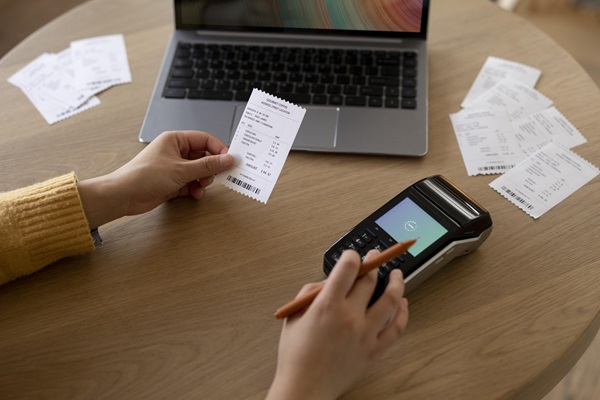 SHARE
SHARE
Proof of Transaction: Definition, Benefits, and 10 Essential Types You Must Know in Business
Febbi S
Transaction evidence is crucial for business owners who often make purchases for operational needs to run a business. But, do you often request evidence of the transactions you've made?
Although for some people, transaction evidence may seem like just a simple receipt with no real value, for business owners, this evidence is a key element for validating each financial report in a business.
In this article, we will discuss what transaction evidence is, its purpose, benefits, and the different types of transaction evidence.
What is Transaction Evidence?
In simple terms, transaction evidence is a document that proves a transaction has occurred and shows one party’s responsibility toward the other.
This document also records activities that cause changes in the assets or finances owned by the business.
For example, selling assets, paying electricity bills, buying goods, or paying daily expenses.
In a company, financial transaction recording is an ongoing activity, such as recording purchases, paying wages, etc. In accounting terms, this recording is fundamental and must be implemented.
With a structured financial record, all types of business transactions can be accounted for in financial statements. These financial transactions actually have a significant impact on the financial condition of a company or organization.
With transaction evidence, you can easily match the transaction values recorded in your business's financial records.
Read more: 7 Benefits of Online Transactions for Business Owners in the Digital Era
The Purpose of Transaction Evidence
Source: Freepik.com
The recording of financial transactions in the form of evidence serves several purposes that benefit companies or business units, including:
- Providing detailed changes in financial sources due to transactions
- Offering reliable financial reports for users
- Giving information about funding sources, capital, and liabilities
- Preventing misunderstandings by neatly storing transaction evidence
- Helping to estimate business potential and profits.
The Benefits of Transaction Evidence
Source: Freepik.com
Besides having specific purposes, recording transaction evidence also has functions and benefits for business systems, such as:
- It can be known by the responsible parties for the transactions that have occurred
- It can avoid duplication in the collection of company financial data
- It serves as a proper medium for collecting financial data
- It minimizes the possibility of errors in financial recording
- It becomes the foundation for financial accounting records.
Read more: 5 Factors Why Food Delivery Services are Thriving
Types of Transaction Evidence
Source: Freepik.com
Have you gained an understanding of transaction evidence, its benefits, and its purposes?
Additionally, you should know that there are many types of transaction evidence. Here are some common examples you might encounter:
- Memo: Contains a short, clear, and easy-to-understand message. It typically consists of a few lines and is considered external evidence
- Credit Note: Used to prove a reduction in debt within a company, which could happen due to returned goods or price reductions
- Debit Note: Used to show a request for a price reduction from the seller or as evidence of returned goods that were not as expected
- Cash Receipt: A transaction document given by the seller to the buyer as proof of a cash payment
- Invoice: A document that details the products sold, including quantity and price. It is generally issued by the seller to the buyer
- Receipt: Given when receiving a payment, it acts as a proof of receipt and shows the amount of money received
- Check: A payment order issued by a bank account holder to pay a specified amount written on the check
- Bank Transfer Slip: A letter that orders the transfer of money from one bank account to another, either within the same bank or between different banks
- Bank Deposit Slip: This transaction evidence is a deposit slip provided by the bank, used as a record for deposits like investments or savings
- Bank Statement: A detailed transaction history of a bank account, provided to the account holder to review transaction activities.
By understanding these different types of transaction evidence, you can more easily comprehend the administrative and financial processes that occur in business or everyday life.
Read more: Bewildered about creating payment invoices? Here are 7 Tips to Make Them
Conclusion
That’s some important information about transaction evidence that you need to know. For business owners, creating a system for recording financial transactions is essential.
Transaction evidence is something that should always be present when making any records or bookkeeping.
Nowadays, there are many companies offering business transaction recording systems, and ESB can be one of your recommendations. With ESB Core (ERP), ESB supports the use of invoice services.
By using ESB’s services, your business can streamline the purchasing process, significantly reduce the risk of fraud, and avoid losses due to unrecorded purchases.
 SHARE
SHARE




